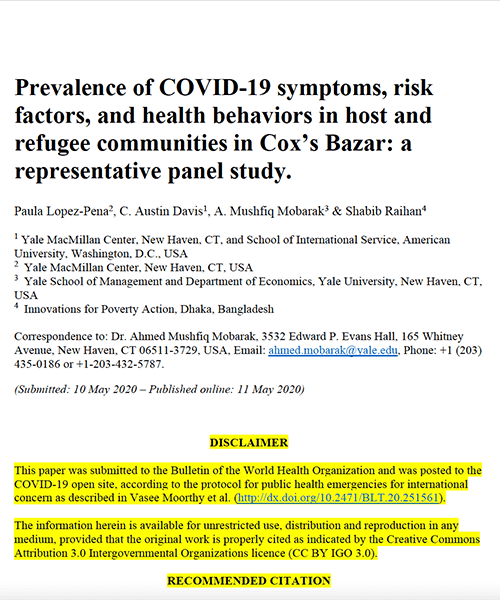
Prevalence of COVID-19 symptoms, risk factors, and health behaviors in host and refugee communities in Cox’s Bazar: a representative panel study
We study the prevalence of COVID-19 symptoms in refugee and host communities and their correlates with current and pre-COVID-19 living conditions. We administered a phone-based survey to a sample of 909 households in Cox’s Bazar which was drawn from a household panel representative of Rohingya refugees and the host population. We conducted a symptoms checklist to assess COVID-19 risk based on the WHO guidelines. We included questions covering returning migration, employment, and food security. We asked additional questions on health knowledge and behaviors to a random subsample (n=460).
24.6% of camp residents and 13.4% of those in host communities report at least one common symptom of COVID-19. Among those seeking treatment, a plurality did so at a pharmacy (42.3% in camps, 69.6% in host communities). While most respondents report good respiratory hygiene, between 76.7% (camps) and 52.2% (host community) had attended a communal prayer in the previous week. Another 47.4% (camps) 34.4% (host community) had attended a non-religious social gathering. The presence of returning migrants, respondent mobility, and food insecurity strongly predict COVID-19 symptoms.
COVID-19 symptoms are highly prevalent in Cox’s Bazar, especially in refugee camps. Attendance at religious and social events threatens efforts to contain the spread of the disease. Pharmacies and religious leaders are promising outlets to disseminate life-saving information.
Full brief: Lopez-Pena P, Austin Davis C, Mushfiq Mobarak A & Raihan S. Prevalence of COVID-19 symptoms, risk factors, and health behaviors in host and refugee communities in Cox’s Bazar: a representative panel study. [Preprint]. Bull World Health Organ. E-pub: 11 May 2020. doi: http://dx.doi.org/10.2471/BLT.20.265173

